韓國(guó)女子愛(ài)美麗?現(xiàn)在她們連化妝品都不想用了! South Korean women destroying makeup in protest against stringent beauty standards
中國(guó)日?qǐng)?bào)網(wǎng) 2018-12-04 13:26

哪個(gè)地方的人最愛(ài)漂亮?可能很多人會(huì)想到韓國(guó),那里無(wú)論老少,幾乎人人都先化妝才出街。
不過(guò)當(dāng)?shù)亟鼇?lái)掀起一場(chǎng)“逃脫束縛”運(yùn)動(dòng),部分女性開(kāi)始反思是否人人都要追求同一種美的標(biāo)準(zhǔn):皮膚白、大眼睛、高鼻梁等。更有網(wǎng)友在社交網(wǎng)站上傳摧毀化妝品的照片或視頻,以此表明自己要擺脫日夜化妝的勞累人生。
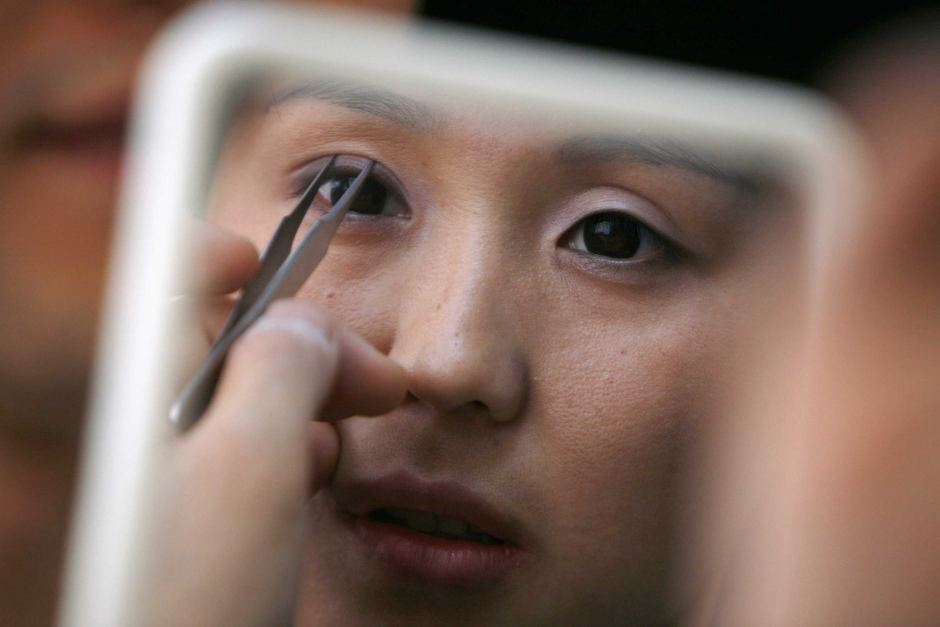
Reuters: Nir Elias, file
South Korean women are destroying cosmetics and cutting their hair short to fight back against unrealistic beauty ideals in what is being dubbed the "escape corset" movement.
韓國(guó)正掀起一場(chǎng)名為“逃脫束縛”的運(yùn)動(dòng),許多韓國(guó)女性扔掉化妝品、剪短頭發(fā),以此抗議對(duì)美不切實(shí)際的追求。
corset ['k??s?t] n.(婦女用的)束腹,緊身褡
In posts across Instagram, Twitter, and other social media platforms, women have been denouncing the use of cosmetics and a culture that pressures as many as one in three women to undergo some form of plastic surgery.
在Ins和推特等社交媒體平臺(tái)上,韓國(guó)女性開(kāi)始反對(duì)使用化妝品,并且對(duì)迫使多達(dá)三分之一的女性接受不同程度整容手術(shù)文化氛圍進(jìn)行抨擊。
今年5月,韓國(guó)一家知名電視臺(tái)的新聞主播成為第一位戴眼鏡出鏡的女主播。此舉在韓國(guó)引發(fā)熱議:女性是不是時(shí)刻都要完美無(wú)瑕?
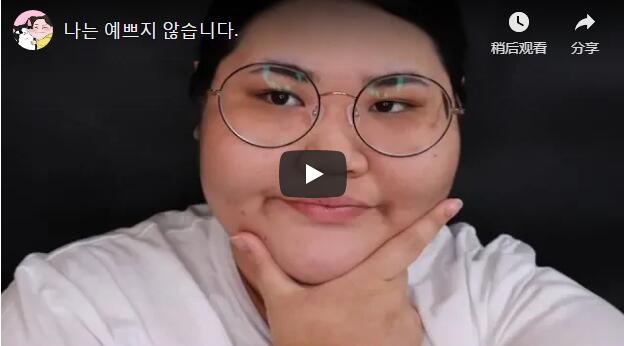
One post on Instagram by user 6_feminist_9 confessed that she had low self-esteem and felt she had to use makeup as a mask just to leave the house.
Ins用戶6_feminist_9在一個(gè)貼子里承認(rèn)自己自卑,出門前必須化妝來(lái)“武裝”自己。
"I liked pretty things. I wanted to be pretty. I hated my ugly face," she posted.
“我喜歡漂亮的事物,想變得漂亮。我討厭自己丑陋的面孔。”
"Self-esteem came and went. I was always putting on makeup. I did not go to school on days when I did not have good makeup.
“自尊心總是時(shí)不時(shí)爆發(fā)一下。我總是在化妝,如果哪天妝化的不好,我就不去上學(xué)。”
現(xiàn)在,她的想法發(fā)生了改變。
"But now you do not have to. It does not have to be pretty. In the meantime, I took off the mask that plagued me and ruined my life."
“但是現(xiàn)在你沒(méi)有必要那么做,不是非得那么漂亮。同時(shí),我摘掉了自己的面具,它困擾我許久,毀掉了我的生活。”
plague [ple?g] vt.折磨,使苦惱
Another user said: "Today is one month since I decided to cut my hair and take a bath!"
另一名用戶說(shuō):“從我決定剪短頭發(fā)并且泡個(gè)澡開(kāi)始,已經(jīng)有一個(gè)月了。
"Cosmetics, lenses, and clothes that are not easy to wear are now used as memorials."
“化妝品、隱形眼鏡和好看卻不好穿的衣服,現(xiàn)在都被我當(dāng)做紀(jì)念品了。”
memorial [m?'m??r??l] n.紀(jì)念物,紀(jì)念儀式
一些網(wǎng)友為表“決心”,更是在社交網(wǎng)站上傳照片或視頻,“摧毀”自己的化妝品,或把化妝品當(dāng)作顏料用來(lái)畫(huà)畫(huà)。
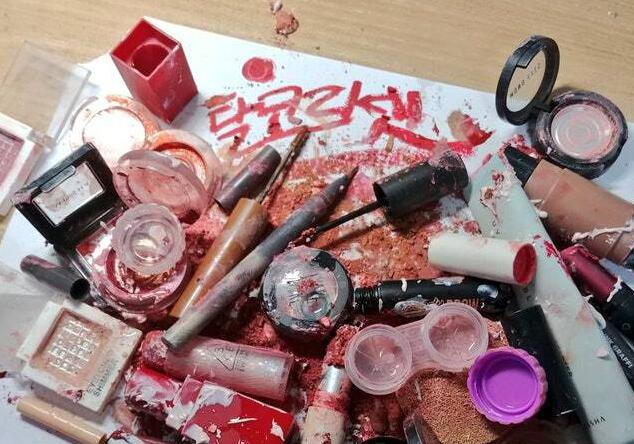
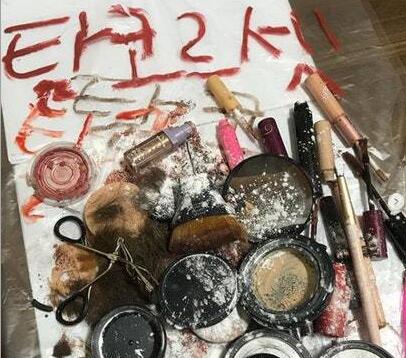
當(dāng)?shù)嘏榆囍窃罚ㄒ糇g,Cha Ji-won)便是其中一人。她把自己的化妝品都丟掉,每月只花4000韓元(約合人民幣24元)買保濕產(chǎn)品或潤(rùn)唇膏,“我覺(jué)得自己像是重生了,一個(gè)人的精神與力量是有限的,我過(guò)去都用來(lái)?yè)?dān)心自己美不美,現(xiàn)在我用這些時(shí)間來(lái)讀書(shū)與做運(yùn)動(dòng)。”
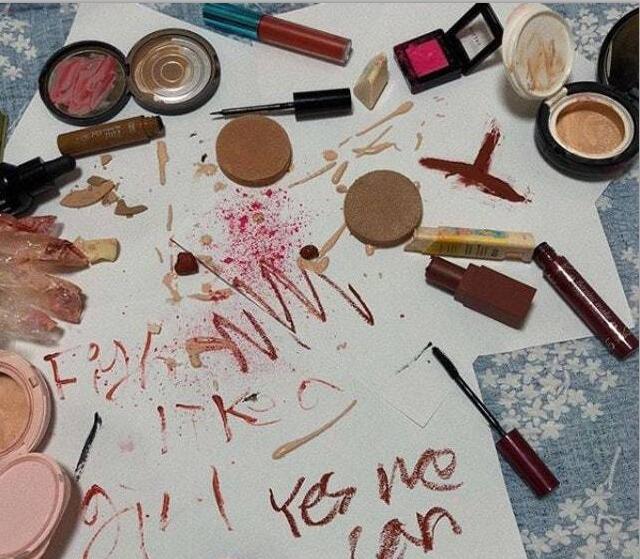
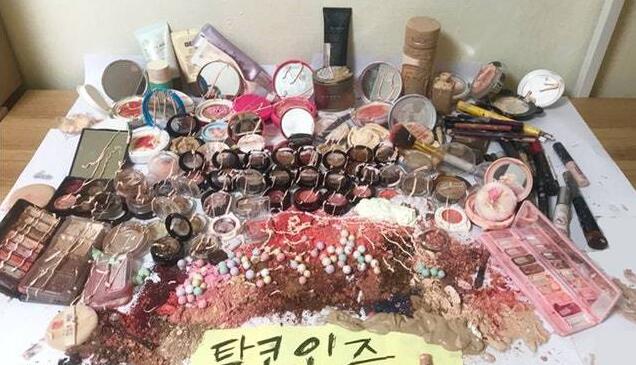
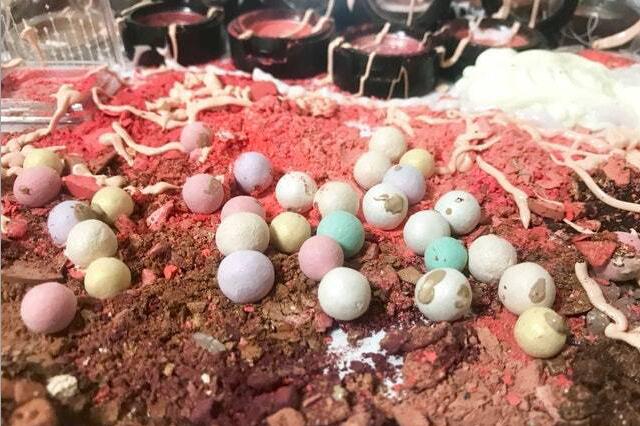
Beauty regimes commonly require women to spend hours applying makeup each day – often involving waking up two hours before work to do so or carrying out lengthy skincare routines that involve 10 steps or more at the end of each day.
在韓國(guó),女性通常每天要花好幾個(gè)小時(shí)化妝。她們每天上班前要提前兩個(gè)小時(shí)起床化妝,每天睡覺(jué)前還要進(jìn)行冗長(zhǎng)的護(hù)膚程序,一般有10多個(gè)步驟。
It is the latest development in the Asian country's exploding feminist movement in the age of #MeToo, in a country that was ranked a poor 116 out of 144 countries on gender equality by the World Economic Forum.
“逃脫束縛”運(yùn)動(dòng)是在#MeToo運(yùn)動(dòng)之后,韓國(guó)爆發(fā)的最新一次女權(quán)運(yùn)動(dòng)。根據(jù)世界經(jīng)濟(jì)論壇的排名,韓國(guó)的性別平等狀況在144個(gè)國(guó)家中排在第116位。
The women abandoning demanding cosmetic regimens call themselves "beauty resisters" and are part of a broader push back against South Korea's highly patriarchal society which places a huge emphasis on a woman's appearance as being key to success in life.
不再化妝的女性稱自己為“美麗抵抗者”,她們以此抵制韓國(guó)高度男權(quán)的社會(huì)。韓國(guó)社會(huì)一直強(qiáng)調(diào)女性的美麗外表是人生成功的關(guān)鍵。
patriarchal society 父權(quán)社會(huì), 男權(quán)社會(huì)
Stories about young women transforming their lives after having plastic surgery and makeovers are abound in soaps and movies, and popular on reality TV.
年輕的韓國(guó)女性在整容和化妝后過(guò)上更好生活的故事頻頻出現(xiàn)在肥皂劇和電影里,在真人秀節(jié)目中也頗受歡迎。
South Korea has a massive beauty industry and in 2017 it was estimated to be worth just over £10bn, according to retail researchers Mintel.
根據(jù)英敏特市場(chǎng)咨詢公司的數(shù)據(jù),韓國(guó)的美容產(chǎn)業(yè)非常龐大。2017年,其美容產(chǎn)業(yè)估計(jì)價(jià)值超過(guò)100億英鎊(約合875億元人民幣)。
Seoul is the global plastic surgery capital and the wealthy neighborhood of Gangnam reportedly has 500 aesthetic centers.
首爾是全球的整容之都。據(jù)報(bào)道,富裕的江南社區(qū)有500家美容中心。
英文來(lái)源:澳大利亞廣播公司、獨(dú)立報(bào)、東方頭條
翻譯&編輯:yaning









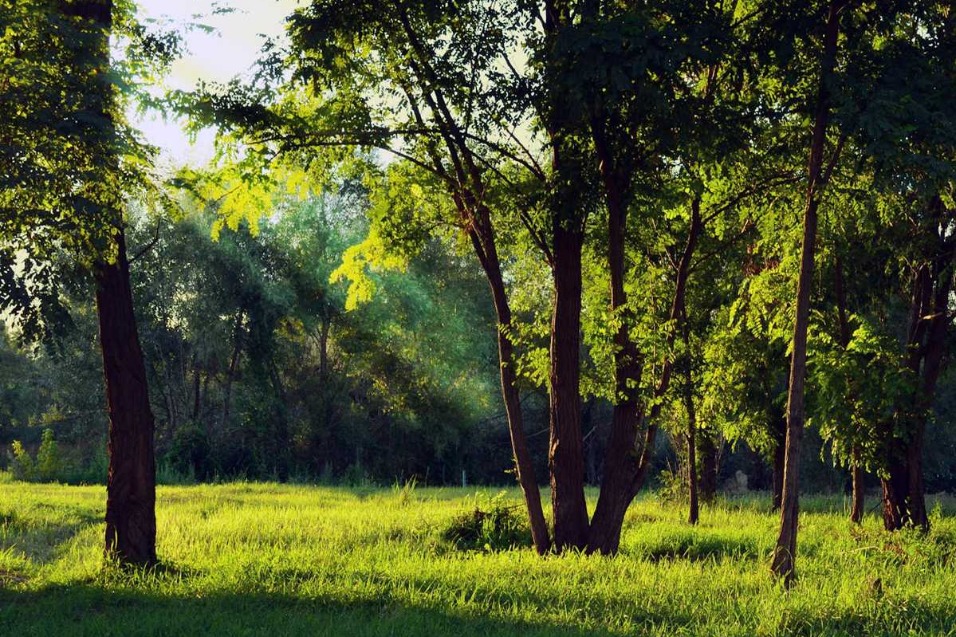







 英語(yǔ)點(diǎn)津微信
英語(yǔ)點(diǎn)津微信 雙語(yǔ)小程序
雙語(yǔ)小程序